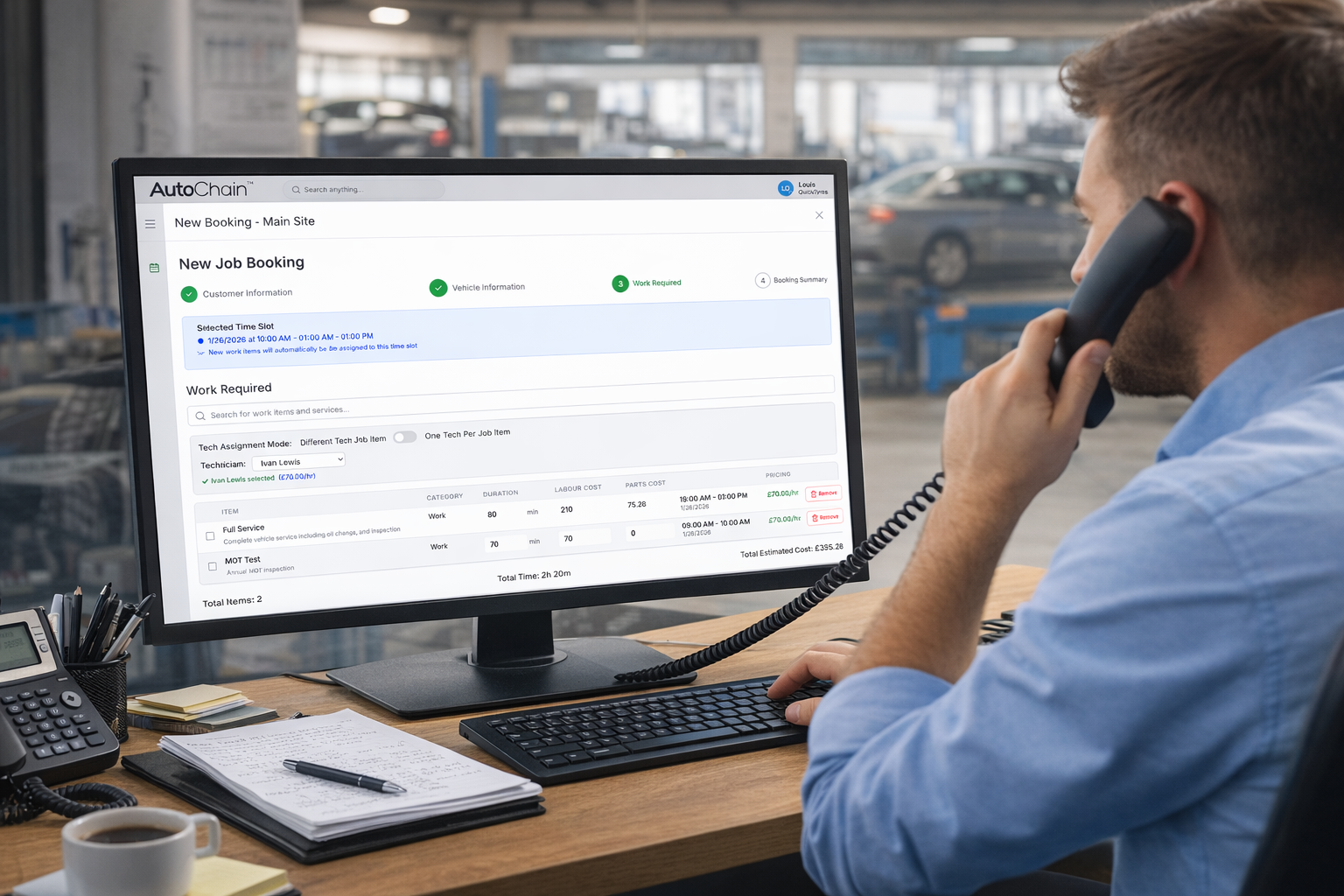Simple Garage Management Software for Independent UK Garages
Manage jobs, vehicles, customers, and service history in one easy system — £69.99/month.
Garage Dashboard
Real-time overview
Everything You Need to Run Your Garage — Nothing You Don't
Simple, practical tools for independent garages
Job & Work Order Management
Create jobs, track progress, and manage work orders efficiently
Vehicle Records & Service History
Keep detailed vehicle records and service history for every customer
Customer Details & Invoices
Manage customer information and generate professional invoices
MOT, Service & Maintenance Tracking
Never miss an MOT or service date with automatic tracking
Cloud-Based Access
Access from any device — no expensive servers required
Unlimited Employee Management
Add unlimited staff with permissions and scheduling — no extra cost
Drag & Drop Calendar
Super easy scheduling — drag and drop jobs to any time slot
Instant Access — Start Within Minutes
No setup fees, no training required — start organising your garage immediately
Simple, Transparent Pricing
Start with the core garage system. Add powerful features as your business grows.
Extend Your System
Add powerful features as you grow
Parts Management
Track inventory, suppliers & stock levels
Tyre Management
Tyre fitting, stock & seasonal storage
OEM Technical Data
Technical drawings & timing manuals
Pay only for what you need. Add or remove modules anytime.
Instant access • Start organising your garage within minutes • Cancel anytime
Modern Features That Save Time
Experience the latest in garage management technology with AutoChain Advance Intelligence and digital workflows

Digital Job Cards: Step-by-step booking wizard with real-time pricing and technician assignment
AutoChain Advance Intelligence
The most advanced logic system for job creation, pricing, and recommendations. Get intelligent suggestions for service items, accurate pricing calculations, and smart recommendations based on vehicle history and service patterns.
Digital Job Cards
Step-by-step booking wizard with real-time pricing, technician assignment, and automatic time slot allocation. Paperless job cards that update instantly—customers get SMS/email updates, technicians access details on any device.
Smart Scheduling
Advanced scheduling logic that optimises your calendar, suggests optimal booking times, and automatically sends reminders to reduce no-shows.
Why UK Independent Garages Choose AutoChain
Lower cost, better features, no long-term contracts. See why UK garages are switching to AutoChain.
AutoChain offers the best value for UK independent garages, with unlimited employees included at no extra cost.
- £69.99/month flat rate
- Unlimited employees included
- No per-user fees
AutoChain offers monthly rolling contracts. Cancel anytime with no penalties or lock-in periods.
- Monthly rolling contract
- Cancel anytime, no fees
- No lock-in periods
AutoChain Advance Intelligence, Digital Job Cards, and Smart Scheduling—cutting-edge features for modern garages.
- AutoChain Advance Intelligence
- Digital Job Cards with real-time pricing
- Customer-facing digital service history
Why Choose AutoChain?
Modern garage management for independent workshops
Digital Service History
Keep all your vehicle's service history in one secure, accessible location.
Trusted Service Network
Connect with verified, trusted service providers in your area.
Increased Vehicle Value
Detailed service records can increase your vehicle's resale value.
Complete Transparency
View detailed service records, parts used, and costs.
Frequently Asked Questions
Everything you need to know about AutoChain
What is AutoChain and how does it work?
AutoChain is a digital platform that connects UK drivers with trusted service providers while maintaining comprehensive vehicle service history records. We help you track maintenance, repairs, and upgrades while connecting you with verified mechanics, garages, and service centres across the UK.
Is AutoChain free to use for vehicle owners?
Yes! AutoChain offers free accounts for vehicle owners with unlimited vehicles. You can track your service history, find trusted providers, and access basic features at no cost. We also offer premium features and business plans for service providers and fleet managers.
How do I find service providers near me?
AutoChain's system connects you with verified garages and service providers in your local area. Simply enter your location and we'll show you trusted mechanics, garages, and service centres nearby. You can filter by service type, read reviews from other vehicle owners, and compare prices to find the best providers near you.
How does AutoChain increase my vehicle's value?
Complete service records can increase your vehicle's resale value by up to 15%. AutoChain creates detailed digital records that never get lost or damaged, providing potential buyers with complete transparency about your vehicle's maintenance history and proving it's been well cared for.
Is my vehicle data secure with AutoChain?
Absolutely. We use bank-level security with 256-bit encryption to protect all your vehicle information. Your data is stored securely in the cloud with automatic backups, and we're fully GDPR compliant. Your privacy and security are our top priorities.
How do I get started with AutoChain?
Getting started is simple! Search for your vehicle above to check your service history, or click "For Drivers" to create a free account and start managing your vehicle's complete digital service history. If you're a service provider, visit our "For Providers" page to join our trusted network.
Latest News & Insights
Stay informed with our latest articles and industry updates